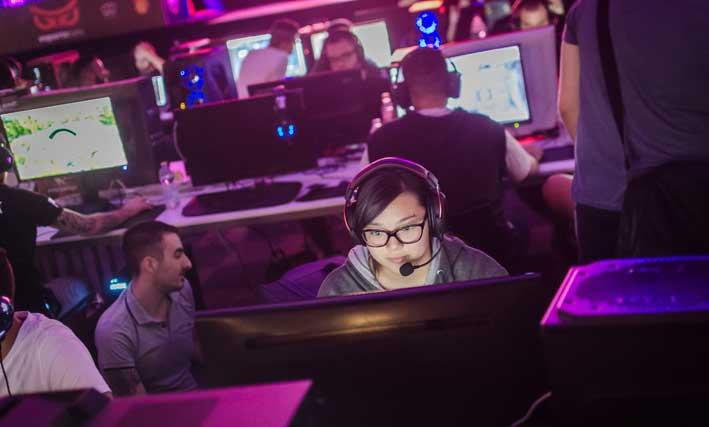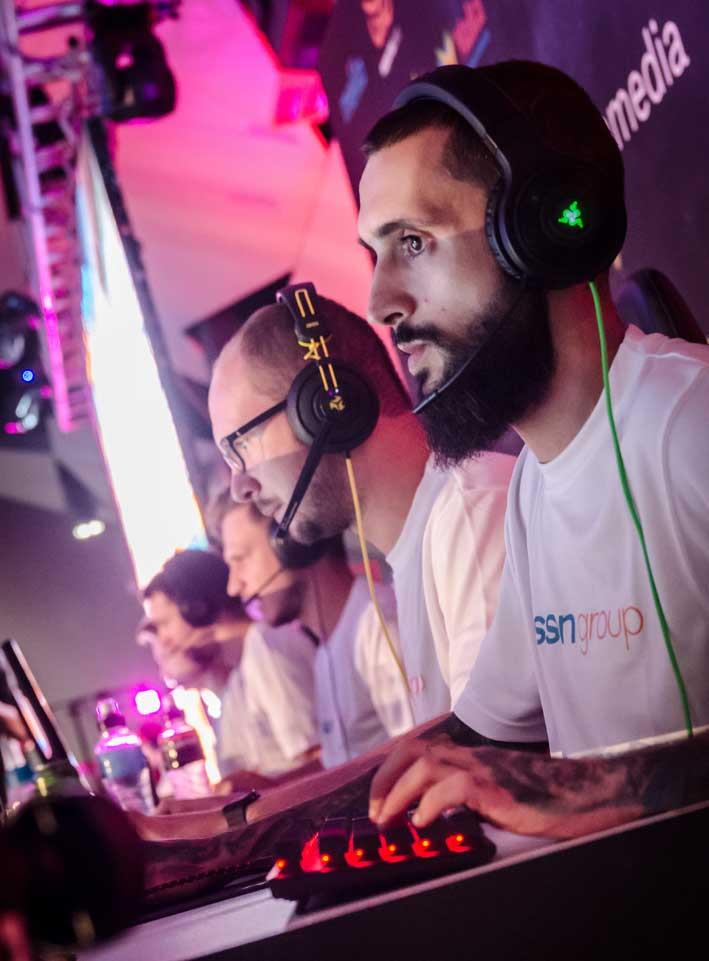Was it always part of your plan to start Quickfire?
Yes and no, because we started organising LAN (Local Area Network) parties about 10 years ago just for fun. I organised my first LAN when I was 16, which 150-200 people attended. It was always something that interested me, but with the market being what it was at the time, I never thought it would grow enough to become a full-time commitment.
As we grew older, our hobby became harder and harder to find time for – so we put our heads together to find a way to stay engaged in the gaming world without the hassle of getting all our equipment together.
Eventually we founded Quickfire, and started by organising online tournaments for League of Legends or Dota on Facebook. The name itself was just a simple term we came up with to emphasise the "quickness" of organising an online tournament.
We always wanted to keep it casual. For example, we would take projectors to pubs and such places, but there was always an element of competition for us to divert attention from other events like the Champions League. As you can imagine, establishment owners are much more likely to show football over eSports.
Over time, we realised that for people to continue engaging with us, we would have to move away from a "casual" mentality. It was not a business model, more like a suggestion to meet and go and watch a match over a beer.
About two years ago, we started looking into the competitive side of things more. In the meantime, there had been a significant rise in IT in Malta, particularly in the iGaming industry. If we had to use an example, Katowice, a small town in Poland comes to mind; it transformed itself into the capital city for eSports within 5-7 years. Once a year its population rises by 300 per cent. People go there solely to watch eSports.
Our objective is to become the main operator of eSports in Malta. We want to push the island as a paradise for eSports: we have the facilities, and we have the necessary hospitality structures in place due to our booming tourist sector.

What kind of events can the public expect in the eSports sector?
Ten years ago, there wasn't a real option for gamers to meet socially, so they would just stay home at their computers for the whole weekend. This led to many people not having the opportunity to spend as much time mingling socially like people who spend their weekends in Paceville.
A social space where eSports enthusiasts can leave the confines of their home to meet other fellow gamers is something that the community has a real thirst for. Not to mention that you are helping to keep young impressionable children away clubs, binge drinking, and potentially hurting themselves.
If I had such a space when I was younger, I would never have wanted to leave!
An issue we have in Malta with regard to the eSports community is the perception that the only gamers on the island are the ones we find in Facebook groups, which is definitely not the case at all.
I have met people myself who have been playing particular games for years, and never had the will or incentive to move onto the scene. Traditionally, the gaming community in Malta tends to be quite toxic in nature, which is why we need to build an ecosystem where values like discipline and sportsmanship are developed and given the right amount of attention.
By building a community with certain principles in mind, you have a solid foundation built on respect for your fellow gamer. This allows individuals who previously may not have understood how the 'banter' of the gaming community works, as it tends to be very toxic in nature, to come forward and properly integrate themselves into the community.
Something we are also improving on in the next (3rd) edition is an eSports festival that takes place over a weekend. The prize pool has reached €15,000 this time around, the highest it has ever been. Malta's iGaming sector helps a lot in this respect, because most of the foreign workers who come here are gamers themselves, and are used to having certain facilities where they can enjoy their hobbies.

Apart from organising LANs and other gaming specific events, are there other areas you are focusing on at the moment?
Right now we are focusing on education. Rather than just marketing our services, we are showing people why they should sponsor eSports events, and educating parents on why they should encourage their children when they show potential.
Parents are showing an interest by bringing their kids to our events. Usually they would be gamers themselves, which definitely helps bridge the generational gap. In his speech at the eSports Forum, Parliamentary Secretary Silvio Schembri himself said that he spends time gaming with his son.
Why? Because it is a bonding experience! It's not something that the child does and the parent watches, it is something that they can together. The fact that you have that relationship enables you to build a certain level of trust which helps you instil positive values in your child.
Now that eSports is getting increased attention and investment, should we expect the public attention given to individuals like Kurt Fenech to become a common occurrence?
I brought this up in my own speech at the forum – not only did Malta finally get into a World Cup, but we also did incredibly well!
One must always balance their priorities, but this line of work has now become more feasible. Parents always ask whether they should allow their children to begin streaming full time, and most of the time the answer is 'no'. It must be eased into very carefully until it becomes clear that it is a viable option.
It's great to say that you've risked it all and made it, but in reality, how many times does it happen? It is not the promised land of success; one must remain grounded when pursuing such goals. Some streamers even work 60 to 80 hours a week to put out content at a respectable rate.

Is eSports a real sport?
Personally, I would not really get into this argument of whether eSports is a 'real sport' or not. The point of the argument is to try to legitimize it, but it does not need legitimizing because it is already legitimate. You have to be insightful enough to see what the numbers are, and acknowledge that this is something big and cannot be ignored any longer.
I was looking up quotes for my speech at the Forum and found one that's particularly interesting on Forbes. Basically, the gist of it was that if you are a Chief Marketing Officer who isn't considering eSports you deserve to be fired on the spot.
I believe the line needs to be drawn when it comes to rights and privileges afforded to other sports.
One has to realise that these individuals who are reaping the success of their eSports careers have spent hours upon hours of studying, training and meetings with sponsors, so why shouldn't they also benefit from those same rights and privileges?
Possibly a good indicator of this is that the Olympics want to involve eSports in their competition. Why do you think they want to do that? They don't want to do that for eSports, they want to do it because they are realising that their audiences are getting smaller, and the eSports audience is getting bigger. If the Olympics do not change, they will die.
You realise that eSports does not need the Olympics – it is the Olympics that needs eSports.
Photos by William Cachia from Game Defined